新概念第一册重点句型
新概念英语第一册语法知识点

新概念英语第一册语法总结时态:一般现在时、现在进行时、一般过去时、现在完成时、一般将来时、过去进行时、过去完成时、过去将来时1. 一般现在时★含有be动词的句子He is a teacher.The girl is very beautiful.Tim and Jack are students.★变疑问句将be动词移到句首Is he a teacher?Is the girl very beautiful?Are Tim and Jack students?★变否定句在be动词后面加notHe is not a teacher.The girl is not very beautiful.Tim and Jack are not students.★肯定回答及否定回答Yes, he is. No, he is not.Yes, she is. No, she is not.Yes, they are. No, they are not.★含有一般动词的句子★第三人称单数及单数名词He likes books.She likes him.The dog likes bones.★变疑问句在句首加does, 动词变为原型Does he like books?Does she like him?Does the dog like bones?★变否定句在主语及动词之间加doesn’t, 动词变为原型He doesn’t like books.She doesn’t like him.The dog doesn’t like bones.★肯定回答及否定回答:Yes, he does. No, he doesn’t.Yes, she does. No, she doesn’tYes, it does. No, it doesn’t.注意:第三人称单数形式一般在动词后面加S。
★其他人称及复数名词I want to have a bath.We have some meat.The students like smart teachers.★变疑问句在句首加doDo you want to have a bath?Do we have any meat?Do the students like smart teachers?★变否定句在主语和动词之间加don’t.You don’t want to have a bath.We don’t have any meat.The students don’t like smart teachers.★肯定回答及否定回答Yes, I do. No, I don’t.Yes, we do. No, we don’tYes, they do. No, they don’t.构成:主语+be动词+动词的现在分词+其它成分We are having lunch.He is reading a book.The dog is running after a cat.The boys are swimming across the river.★变疑问句将be动词移到句首Are we having lunch?Is he reading a book?Is the dog running after a cat?Are the boys swimming across the river?★变否定句在be动词后面加notWe are not having lunch.He is not reading a book.The dog is not running after a cat.The boys are swimming across the river.★特殊疑问句:what, which, how, where, who, etc.疑问词+be动词+主语+现在分词What are you doing?What is she doing?What is the dog doing没有进行时的动词(必背)表示状态、思想、感情、感觉的动词不能表示正在进行的动作1. 表示感觉、感官的词see, hear, like, love, want2. have, has作为动词”拥有”的含义时,没有进行时常和表示过去的时间状语连用,如yesterday, last night, the day before yesterday, three days ago.含有be动词的句子,将动词变为过去式,am / is的变为was,are的变为wereI was at the butcher’s.You were a student a year ago.The teacher was very beautiful ten years ago.★变疑问句将be动词移动到句首Were you at the butcher’sWere you a student a year agoWas the teacher very beautiful ten years ago★变否定句在be动词后面加notI was not at the butcher’s.You were not a student a year ago.The teacher was not very beautiful ten years ago.★肯定回答否定回答Yes, I was. No, I was not.Yes, you were. No, you were not.Yes, he/she was. No, he/she was not.★特殊疑问句:What did you do?不含有be动词的句子,将动词变为过去式,动词过去式构成见附录I finished my homework yesterday.The boy went to a restaurant.The Sawyers lived at King Streeta year ago.King Streeta year ago.★变疑问句在句首加did,动词变为原型Did you finish your homework yesterday?Did the boy go to a restaurant?Did the Sawyers live at King Streeta year ago?King Streeta year ago★变否定句在主语和动词之间加did not,动词变为原型I did not finish my homework yesterday.The boy did not go to a restaurant.The Sawyers did not live at King Streeta year ago.King Streeta year ago.★肯定回答及否定回答Yes, I did. No, I didn’t.Yes, he did. No, he didn’t.Yes, they did. No, they did not.have/has+过去分词用法:1)表示过去发生且和现在有某种联系的动作,常和just, usually, already, since等时间副词连用I have just had lunch. (饱了,不用再吃了)He has had a cup of tea.(不渴了,不用再喝)They have already had their holiday. (不能再度假了)The boy has already read the book. (已经知道书的内容了,不用再看了)2)询问别人是否做过某事一般用现在完成时Have you finished your homework?Have you been to Beijing?Have he seen the film?3)表示开始于过去并持续到现在的动作I have lived in Beijing for twenty years.I have worked for this school for 1 year.4)表示一种经历、经验:去过…地方,做过…事情,经历过…事情I have never had a bath.I have never seen a film.I have never been to cinema.I have ever been to Paris.Have been to表示去过,have gone to 表示去了I have been to London.(人已经回来)He has gone to London.(人还在那里)5)表示一种结果,一般不和时间副词联用I have lost my pen.I have hurt myself.He has become a teacher.She has broken my heart.句型变化:★变疑问句将助动词移到句首,变否定句在助动词后面加not.Have you lost your pen I have not lost my pen.★肯定回答及否定回答Yes, I have. No, I have not.★特殊疑问句:What have you done?What has he done一般过去时与现在完成时的区别:凡是有明确的表示过去的时间状语的句子为过去时注意:有些动词表示的动作有一个终点,不能再延续,因此不能和表示一段时间状语连用错:I’ve left Beijing for 3 days.对:I left Beijing 3 days ago. I have been away from being for 3 days.经常和tomorrow, next year, the day after tomorrow, the year after the next, in five hours’ time, etc. 表示将来的词联用结构:主语+助动词will+动词原形I will go to America tomorrow.The pilot will fly to Japan the month after the next.Jack will move into his new house tomorrow morning.★变疑问句将助动词移到句首Will you go to America tomorrow?Will the pilot fly to Japan the month after the next?Will Jack move into his new house tomorrow morning?★变否定句在助动词后面加notI will not go to America tomorrow.The pilot will not fly to Japan the month after the next.Jack will not move into his new house tomorrow morning★肯定回答及否定回答Yes, I will. No, I will not.Yes, he/she will. No, he/she will not.Yes, he will. No, he will not.★特殊疑问句:What will you do结构:had+过去分词After she had finished her homework, she went shopping.They had sold the car before I asked the price.The train had left before I arrived at the station.After/before引导的时间状语从句放在句首要在句子后面加逗号,如果放在主句后则不用。
新概念英语第一册复习一

第一篇基本词句一、基本句子(牢记):Excuse me!不好意思!打拢了——Is this your handbag? 这是你的手提包吗?——Yes,it is. 是,这是我的手提包。
——No,it isn't. 不,这不是我的手提包。
——How are you today? 你今天感觉如何?——I'm fine,thank you. 我很好,谢谢你。
How do you do? 您好(初次见面,正式打招呼时)——Nice to meet you. 很高兴认识你。
——Nice to meet you,too. 我也是。
——what is your job? 你有职业是什么?——I am an English teacher. 我是一名英语老师。
——what colour is your dress? 你的裙子是什么颜色?——My dress is blue. 我的裙子是蓝色的。
——Are you French? 你是法国人吗?——Yes,I am. 是的,我是法国人。
——No,I am not. 不,我不是。
——What nationality are you? 你的国籍是哪里?——I am French. 我是法国人。
——I am American. 我是美国人。
——Which one? 哪一个?——The red one. 红色的那个。
——Which ones? 哪些?——The red ones. 红色的那些。
——Where is it? 它在哪里?——It's on the desk. 它在书桌上。
——Where are they? 他们在哪里?——They are in the kitchen. 他们在厨房。
What's the weather like today? 今天天气如何?What's he/she/it doing? 他/她/它在做什么?——What's are they doing?他们正在做什么?——They are doing their homework.他们正在做家庭作业。
新概念第一册重点及重要句型121
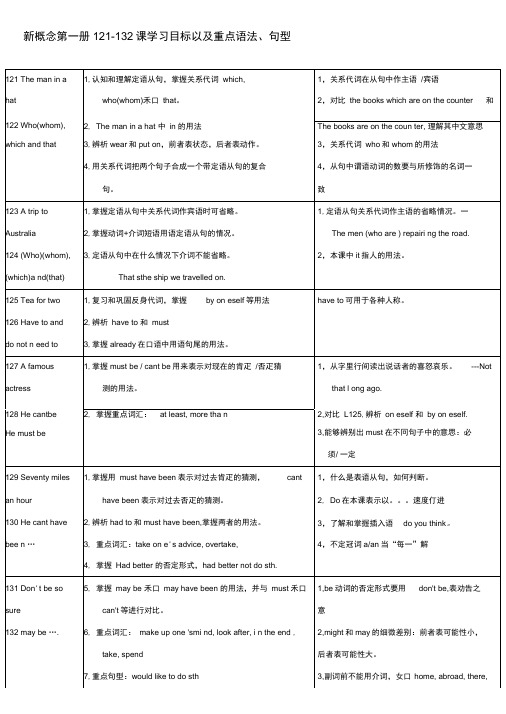
新概念第一册121-132课学习目标以及重点语法、句型who ,①(先行词)人+ who/that + 动词(作主语)The man who has white hair is .②(先行词)人 +whose +名词+动词(作定语)I have a friend whose father is a teacher.③(先行词)人 + who/whom/that + 及物动词/不及物动词 +介词(做宾语)The man we met is my uncle.④(先行词)物 + which/that + 动词(作主语) Lesson 121 & 122 The man in a hat 戴帽子的男士重点句型:在作业本上抄写重点句型,并翻译成汉语: 1. Who served you, sir .2. The lady who is standing behind the counter.3. Is this the man that you served, Caroline4.1 recognize him now.5. She is the woman who I served yesterday. 重要语法一一定语从句定语从句像形容词一样起修饰作用 ,但位于所修饰的名词之后。
定语从句由关系代词引导,紧跟在它所修饰的成分后面。
关系代词 whom 与that 修饰人,which 与that 修饰东西。
关系代词指代从句的主语或宾语,同时又充当连接词,把从句和主句连接起来1、关系代词: who, whom, whose, which, thatwhich 是指人以外的生命或没有生命的东西.:This is the bird which always sings at night. ⑤(先行词)物 +which/that + 主语 + 及物动词(作宾语) .:This is the letter I received yesterday.2、定语从句中的省略① 当关系代词代表主语并且从句中的谓语动词是(现在)进行时时态时,关系代词及助动词 be 均可省略② 如果关系代词在从句中作动词或介词的宾语,关系代词往往可以省略。
新概念第一册重点及重要句型1-12
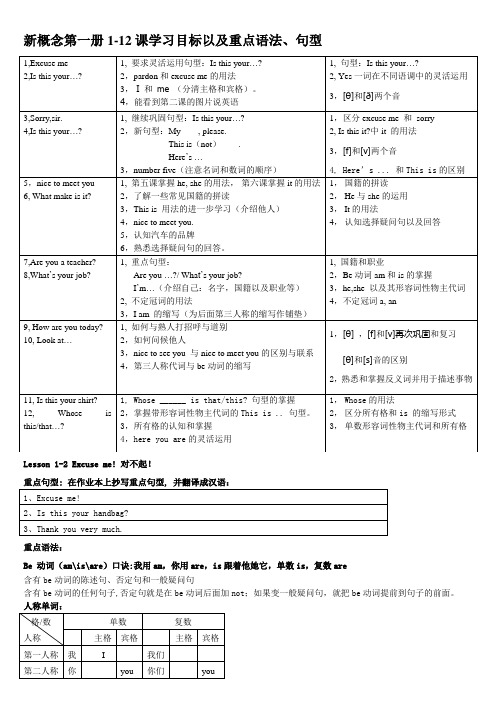
新概念第一册1-12课学习目标以及重点语法、句型Lesson 1-2 Excuse me! 对不起!重点句型: 在作业本上抄写重点句型, 并翻译成汉语:重点语法:Be 动词(am\is\are)口诀:我用am,你用are,is跟着他她它,单数is,复数are含有be动词的陈述句、否定句和一般疑问句含有be动词的任何句子,否定句就是在be动词后面加not;如果变一般疑问句,就把be动词提前到句子的前面。
人称单词:重点句型:重要语法1.祈使句:祈使句:主语通常不直接表示出来,其谓语动词用原型,也叫无主句。
表示命令、请求、建议、叮嘱等。
祈使句真正的主语是你,但省略了。
My umbrella and my coat please. 省略了动词和间接宾语的祈使句。
Keep off the grass! 请勿践踏草地!Help yourself! 请自己动手!某些祈使动词可以后跟and和另一个祈使动词,而不是后跟带to的动词不定式结构。
Come and see this goldfish.Go and buy yourself a new pair of shoes. 去给自己买双新鞋吧。
Wait and see. 等着瞧吧。
2.倒装句:here is 是简单的倒装句,be 动词放在here 的后面,这个句式就可以成为简单的倒装句式。
My ticket is here. 我的票在这。
Here is my ticket. / Here's my ticket.3.状态句之一:某物是某物在英语句子中,有一种句子表述的是静态的内容,只说明状态,没有动作:1).This is my handbag 这是我的手提包2).Is this your umbrella? 这是你的雨伞吗?3).He is my friend .他是我的朋友.Lesson 5 & 6 Nice to meet you. 很高心见到你。
新概念英语第一册重点句型

第1-24课重点句型1.Here's your umbrella and your coat.这是您的伞和大衣2.My coat and my umbrella please.请把我的大衣和伞拿给我。
3.She's Japanese.她是日本人4.What nationality are you?你是哪国人?5.I'm Italian.我是意大利人6.What's your job?你是做什么工作的?7.I'm a keyboard operator.我是电脑录入员。
8.I'm an engineer.我是工程师。
9.How's Emma?埃玛好吗?10.She's very well, too.她也很好。
11.Whose shirt is that?那是谁的衬衫?12.Is this shirt Tim's? 这件衬衫是蒂姆的吗?13.Tim's shirt's white.蒂姆的衬衫是白色的14.What colour's your new dress你的新连衣裙是什么颜色的?15.It's the same colour.一样的颜色e and meet our employees.来见见我们的雇员。
17.What are their jobs? 她们是做什么工作的?18.They're keyboard operators她们是电脑录入员。
19.What's the matter, children?怎么啦,孩子们?20.Give me some glasses please, Jane.请拿给我几只玻璃杯,简Lesson25-Lesson361.There is a refrigerator in the kitchen. 厨房里有个电冰箱。
2.There is a table in the middle of the room.房间的中央有张桌子。
新概念英语第一册单词+短语+重点句型
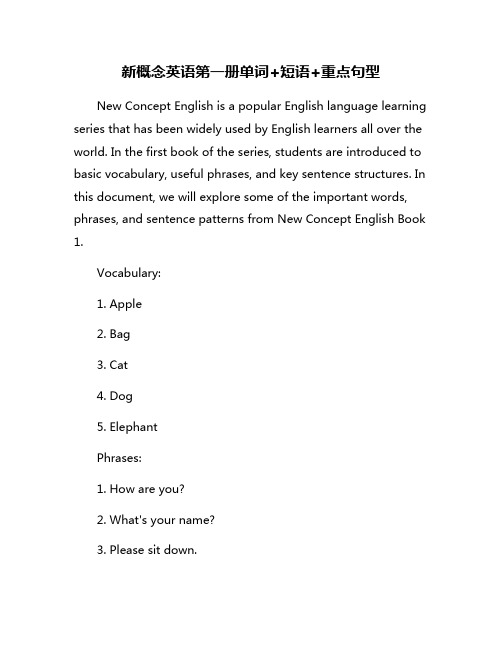
新概念英语第一册单词+短语+重点句型New Concept English is a popular English language learning series that has been widely used by English learners all over the world. In the first book of the series, students are introduced to basic vocabulary, useful phrases, and key sentence structures. In this document, we will explore some of the important words, phrases, and sentence patterns from New Concept English Book 1.Vocabulary:1. Apple2. Bag3. Cat4. Dog5. ElephantPhrases:1. How are you?2. What's your name?3. Please sit down.4. How do you do?5. What's the time?Key Sentence Patterns:1. Subject + Verb: The cat sleeps.2. Subject + Verb + Object: The dog eats meat.3. Subject + Verb + Adverb: She reads quickly.4. Subject + Verb + Adjective: He is tall.5. Subject + Verb + Object + Adverb: They sing songs loudly.As students progress through New Concept English Book 1, they will become more familiar with these words, phrases, and sentence patterns. By practicing them regularly, students can improve their English language skills and become more confident in using English in everyday conversations.In conclusion, New Concept English Book 1 is a great resource for English learners to build a solid foundation in the language. By mastering the basic vocabulary, useful phrases, and key sentence patterns introduced in this book, students can develop their English proficiency and communicate effectively in English-speaking environments.。
新概念英语第一册重点词汇和语法(完整版)
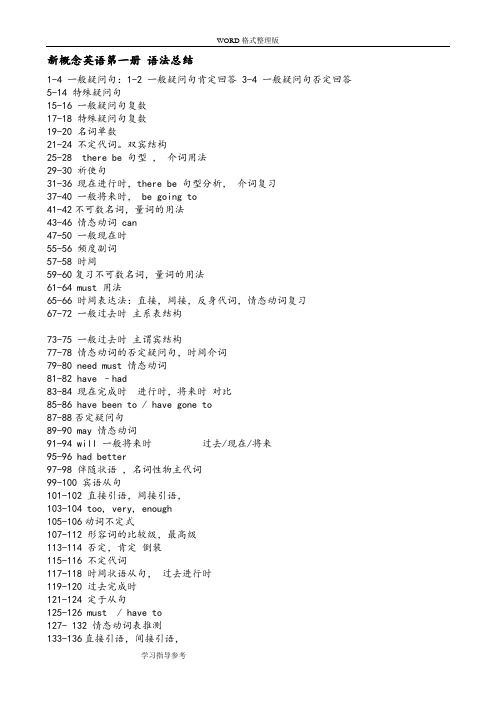
新概念英语第一册语法总结1-4 一般疑问句:1-2 一般疑问句肯定回答 3-4 一般疑问句否定回答5-14 特殊疑问句15-16 一般疑问句复数17-18 特殊疑问句复数19-20 名词单数21-24 不定代词。
双宾结构25-28 there be 句型,介词用法29-30 祈使句31-36 现在进行时,there be 句型分析,介词复习37-40 一般将来时, be going to41-42不可数名词,量词的用法43-46 情态动词 can47-50 一般现在时55-56 频度副词57-58 时间59-60复习不可数名词,量词的用法61-64 must 用法65-66 时间表达法:直接,间接,反身代词,情态动词复习67-72 一般过去时主系表结构73-75 一般过去时主谓宾结构77-78 情态动词的否定疑问句,时间介词79-80 need must 情态动词81-82 have –had83-84 现在完成时进行时,将来时对比85-86 have been to / have gone to87-88否定疑问句89-90 may 情态动词91-94 will 一般将来时过去/现在/将来95-96 had better97-98 伴随状语,名词性物主代词99-100 宾语从句101-102 直接引语,间接引语,103-104 too, very, enough105-106动词不定式107-112 形容词的比较级,最高级113-114 否定,肯定倒装115-116 不定代词117-118 时间状语从句,过去进行时119-120 过去完成时121-124 定于从句125-126 must / have to127- 132 情态动词表推测133-136直接引语,间接引语,137-138 条件状语从句139-140宾语从句141-144 被动语态Lesson 1 Excuse me1. Words1) excuse (1)重音(2)与sorry 的区别(3)Excuse 用的不同场景a. 请别人让路b. 引起别人的注意c. 打断别人的谈话d. 可以当n. 借口 eg. No excuse. 别找借口,没有借口。
新概念英语第一册所有语法点汇总)
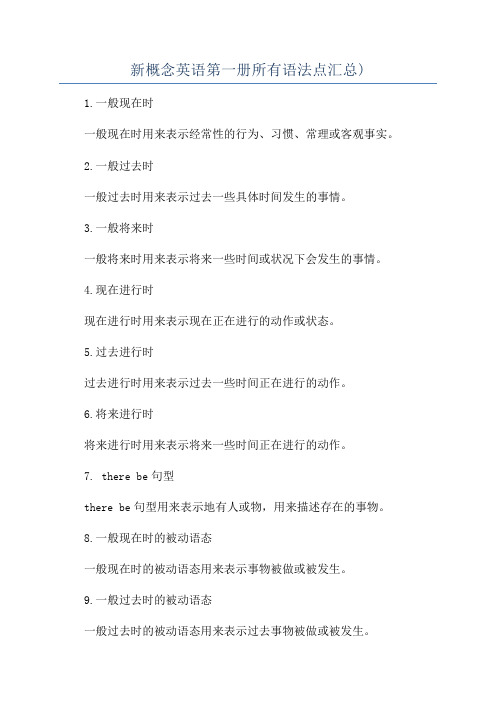
新概念英语第一册所有语法点汇总)1.一般现在时一般现在时用来表示经常性的行为、习惯、常理或客观事实。
2.一般过去时一般过去时用来表示过去一些具体时间发生的事情。
3.一般将来时一般将来时用来表示将来一些时间或状况下会发生的事情。
4.现在进行时现在进行时用来表示现在正在进行的动作或状态。
5.过去进行时过去进行时用来表示过去一些时间正在进行的动作。
6.将来进行时将来进行时用来表示将来一些时间正在进行的动作。
7. there be句型there be句型用来表示地有人或物,用来描述存在的事物。
8.一般现在时的被动语态一般现在时的被动语态用来表示事物被做或被发生。
9.一般过去时的被动语态一般过去时的被动语态用来表示过去事物被做或被发生。
10.一般将来时的被动语态一般将来时的被动语态用来表示将来事物将被做或被发生。
11.现在进行时的被动语态现在进行时的被动语态用来表示事物正在被做或被发生。
12.过去进行时的被动语态过去进行时的被动语态用来表示过去事物正在被做或被发生。
13. do与does的用法do和does用来构成否定句、疑问句和回答。
14.现在完成时现在完成时用来表示过去发生的动作对现在造成的影响或结果。
15.现在完成进行时现在完成进行时用来表示从过去开始一直延续到现在的动作,且这个动作可能还会继续下去。
16.过去完成时过去完成时用来表示过去在一些时间或事件之前已经完成的动作。
17.过去完成进行时过去完成进行时用来表示过去一些时间持续进行的动作,这个动作在另一个过去时间之前已经结束。
18.表示数量的词表示数量的词包括数词、基数词、序数词、分数和百分数等。
19.表示频率的词表示频率的词用来描述件事情发生的频率,如常常、经常、有时、很少、从不等。
20.表示时间的词表示时间的词用来描述一些事件发生的时间,如年、月、日、星期、时、分、秒等。
21.表示地点的词表示地点的词用来描述一些事件发生的地点,如国家、城市、街道、大楼等。
新概念1 重点句型

60. Can you find them?
你能找到他们吗?
61. The kettle’s boiling.
水开了。
62. Can she type a letter for me?
她能为我打一封信吗?
63. Ask her please.
请问问她。
64. I can’t read it.
新概念1重点句型
Lesson1--50
译文
1.Excuse me!
对不起,打扰一下。
2.Pardon?
对不起,请再说一遍。
3.Is this your handbag?
Yes, it is. No, it isn’t.
这是你的手提包吗?
是,它是。不,它不是。
4.Thank you very much.
在天空中飘着几朵云,但阳光明媚。
46. Sally is looking at a big ship.
Sally正看着一艘大轮船。
47. Here is another photograph of our village.
这是另一张我们村庄的照片。
48. He is swimming across the river.
太阳升得早,却落得晚。
The sun rises early, and sets late.
Sawyer一家住在国王街87号
The Sawyers live at 87 King Street.
早上,Sawyer先生去上班,孩子们去上学。
In the morning, Mr. Sawyer goes to work and the children go to school.
新概念第一册最重要的词组及句型
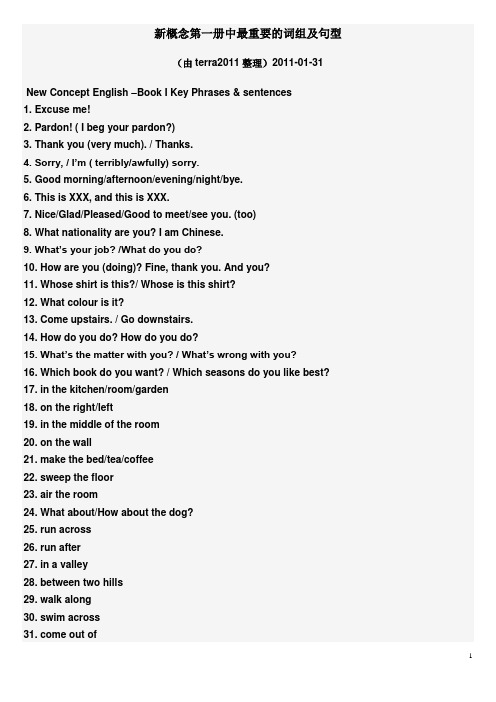
新概念第一册中最重要的词组及句型(由terra2011整理)2011-01-31New Concept English –Book I Key Phrases & sentences1. Excuse me!2. Pardon! ( I beg your pardon?)3. Thank you (very much). / Thanks.4. Sorry, / I’m ( terribly/awfully) sorry.5. Good morning/afternoon/evening/night/bye.6. This is XXX, and this is XXX.7. Nice/Glad/Pleased/Good to meet/see you. (too)8. What nationality are you? I am Chinese.9. What’s your job? /What do you do?10. How are you (doing)? Fine, thank you. And you?11. Whose shirt is this?/ Whose is this shirt?12. What colour is it?13. Come upstairs. / Go downstairs.14. How do you do? How do you do?15. What’s the matter with you? / What’s wrong with you?16. Which book do you want? / Which seasons do you like best?17. in the kitchen/room/garden18. on the right/left19. in the middle of the room20. on the wall21. make the bed/tea/coffee22. sweep the floor23. air the room24. What about/How about the dog?25. run across26. run after27. in a valley28. between two hills29. walk along30. swim across31. come out of32. go into33. What are you doing?34. What are you going to do?35. make a bookcase36. Here you are.37. Pink’s her favourite colour.38. do with39. in front of / in the front of40. be careful41. a piece/loaf/bar/tin/pound/cake/bunch/kilo/basket/bottle/glass/cup/dish of42. half a pound of / a quarter of a pound of43. over there44. next door45. black /white coffee46. to tell (you) the truth47. I don’t like the chicken either.48. Where are you from?/Where do you come from?49. What’s the climate/weather like in …..?50. in spring/summer/autumn/winter51. in the east/north/west/south52. It’s our favourite subject of conversation.53. go to school/work/bed/hospital/church/go home54. take sb to someplace55. stay at home56. eat one’s lunch/ have lunch/breakfast/dinner/supper57. read one’s newspaper58. by car /tax i/bus /bike /train /ship /sea /air /plane /boat ; on foot59. What time is it?/What’s the time?60. What else do you want?61. stay in bed62. call the doctor63. have a (bad) cold/headache/earache/toothache/stomach ache/backache64. have measles/mumps/have a temperature/fever/65. have / take some medicine66. rich food67. keep the room warm68. Can I have the key to the front door?69. enjoy oneself/have a good time70.at the butcher’s/greengrocer’s/grocer’s / hairdresser’s/stationer’s / baker’s71. be absent from72. in the country73. Aren’t you lucky!74. How are you all keeping?75. hundreds / thousands / millions of76. at / in the race77. in the crowd78. on the way/by the way79. What’s sb like?80. answer the telephone81. speak to sb82. last night/week/month/year83. the week/month/year/night before last84. lose one’s way85. at the bust stop/bus station/train station/airport/fire station/police station86. ask sb the way87. say/talk to oneself88. Can you tell me the way to King Street, please?89. put….into90. take out91. What size?92. in fashion/out of fashion93. a pair of shoes/socks/gloves/pants/trousers/stockings/slippers94. I’m afraid….95. make a shopping list96. a lot of / many /much97. have a bath/shower/swim/haircut/holiday/a walk/a look/a cigarette/a car crash98. I’m nearly ready.99. Excuse the mess.100. What’s on?101. on television102. Just like London!103. all the time104. What’s the number of the car? 105. try to do sth/manage to do106. drive into107. for/on sale108. How much is it?109. Have the last word110. move in/into/out/out of111. miss sb112. miss the bus/catch the train113. give sb one’s best regards/wishes 114. next-door neighbour115. fly to someplace116. the week/month/year/night after next 117. over the bridge118. plenty of119. in five hours’ time120. belong to121. hurt one’s back122. at once/first/last123. write (a letter ) to sb124. speak up125. next to sb126. cheer up127. How do you spell “intelligent”? 128. be full of129. want/tell/ask/advise sb to do sth 130. as well=too131. less/more than132. What a pity/nuisance/mess/shame! 133. buy …..on installments134. pay a deposit of ……..135. as…as/not (so) as….as136. get on/off the bus137. change a note138. Don’t believe her.139. on the floor140. look for141. turn of/off/up/down142. What’s up?143. go back to sleep144. forget to do sth/doing sth145. behind the counter146. put on/take off147. look out of148. have to do sth149. at least/at most150. wave to sb151. on a race track152. speed limit153. take one’s advice154. go abroad155. make up one’s mind (to do sth)/decide to sth 156. look after=take care of157. in the end=at last158. make a new film/movie159. get married160. travel around the world161. see the world162. depend on163. be late for164. extra work165. make up one’s face166. be dressed in…..167. beauty spot168. look/walk through169. be covered with170. cigarette ends.。
新概念英语第一册语法总结
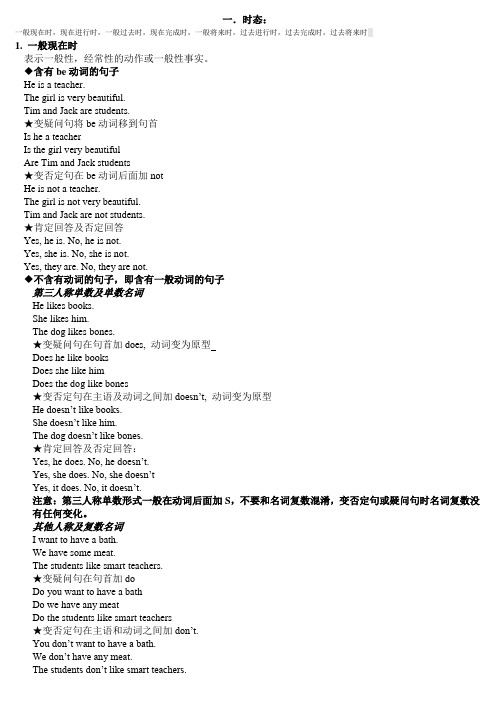
一.时态:一般现在时,现在进行时,一般过去时,现在完成时,一般将来时,过去进行时,过去完成时,过去将来时1. 一般现在时表示一般性,经常性的动作或一般性事实。
◆含有be动词的句子He is a teacher.The girl is very beautiful.Tim and Jack are students.★变疑问句将be动词移到句首Is he a teacherIs the girl very beautifulAre Tim and Jack students★变否定句在be动词后面加notHe is not a teacher.The girl is not very beautiful.Tim and Jack are not students.★肯定回答及否定回答Yes, he is. No, he is not.Yes, she is. No, she is not.Yes, they are. No, they are not.◆不含有动词的句子,即含有一般动词的句子第三人称单数及单数名词He likes books.She likes him.The dog likes bones.★变疑问句在句首加does, 动词变为原型Does he like booksDoes she like himDoes the dog like bones★变否定句在主语及动词之间加doesn’t, 动词变为原型He doesn’t like books.She doesn’t like him.The dog doesn’t like bones.★肯定回答及否定回答:Yes, he does. No, he doe sn’t.Yes, she does. No, she doesn’tYes, it does. No, it doesn’t.注意:第三人称单数形式一般在动词后面加S,不要和名词复数混淆,变否定句或疑问句时名词复数没有任何变化。
新概念英语第一册全部语法
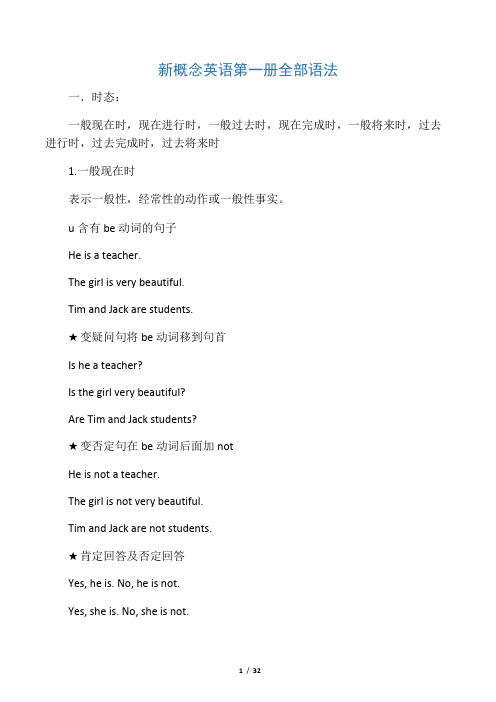
新概念英语第一册全部语法一.时态:一般现在时,现在进行时,一般过去时,现在完成时,一般将来时,过去进行时,过去完成时,过去将来时1.一般现在时表示一般性,经常性的动作或一般性事实。
u含有be动词的句子He is a teacher.The girl is very beautiful.Tim and Jack are students.★变疑问句将be动词移到句首Is he a teacher?Is the girl very beautiful?Are Tim and Jack students?★变否定句在be动词后面加notHe is not a teacher.The girl is not very beautiful.Tim and Jack are not students.★肯定回答及否定回答Yes, he is. No, he is not.Yes, she is. No, she is not.Yes, they are. No, they are not.u不含有动词的句子,即含有一般动词的句子第三人称单数及单数名词He likes books.She likes him.The dog likes bones.★变疑问句在句首加does,动词变为原型Does he like books?Does she like him?Does the dog like bones?★变否定句在主语及动词之间加doesn’t,动词变为原型He doesn’t like books.S he doesn’t like him.The dog doesn’t like bones.★肯定回答及否定回答:Yes, he does. No, he doesn’t.Yes, she does. No, she doesn’t1/8Yes, it does. No, it doesn’t.注意:第三人称单数形式一般在动词后面加S,不要和名词复数混淆,变否定句或疑问句时名词复数没有任何变化。
新概念英语第1册重点句型

新概念英语第1册Word版Lesson 1 Excuse me! 对不起!Listen to the tape then answer this question.Whose handbag is it?Excuse me! Yes?Is this your handbag? Pardon?Is this your handbag? Yes, it is. Thank you very much. 对不起! 什么事?这是您的手提包吗?对不起,请再说一遍。
这是您的手提包吗?是的,是我的。
非常感谢!Lesson 3 Sorry, sir.对不起,先生。
Listen to the tape then answer this question.My coat and my umbrella please. Here is my ticket. Thank you, sir. Number five.Here's your umbrella and your coat.This is not my umbrella.Sorry sir. Is this your umbrella?No, it isn't.Is this it?Yes, it is. Thank you very much.请把我的大衣和伞拿给我。
这是我(寄存东西)的牌子。
谢谢,先生。
是5号。
这是您的伞和大衣这不是我的伞。
对不起,先生。
这把伞是您的吗?不,不是!这把是吗?是,是这把非常感谢。
Lesson 5 Nice to meet you 很高兴见到你。
Listen to the tape then answer this question.Is Chang-woo Chinese?MR. BLAKE: Good morning.STUDENTS: Good morning, Mr. Blake.MR. BLAKE: This is Miss Sophie Dupont.Sophie is a new student. She is French. MR. BLAKE: Sophie, this is Hans. He is German. HANS: Nice to meet you.MR. BLAKE: And this is Naoko. She's Japanese. NAOKO: Nice to meet you.MR. BLAKE: And this is Chang-woo. He's Korean. CHANG-WOO: Nice to meet you. MR. BLAKE: And this is Luming. He is Chinese. LUMNG: Nice to meet you.MR. BLAKE: And this is Xiaohui. She's Chinese, too. XIAOHUI: Nice to meet you.布莱克先生:早上好。
新概念英语第一册重点句型总结
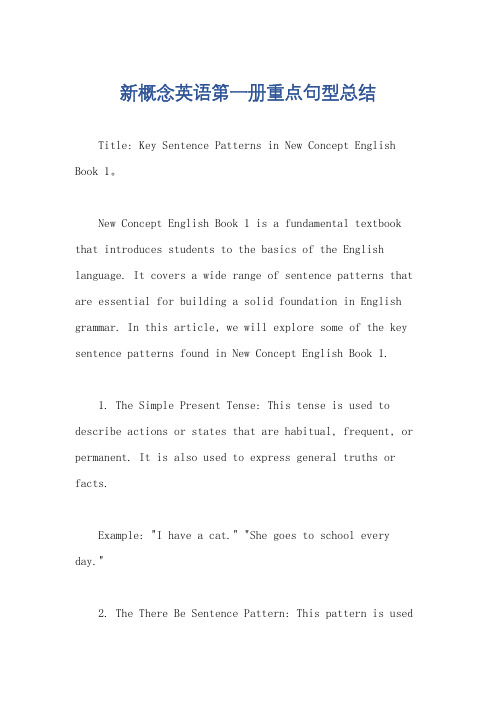
新概念英语第一册重点句型总结Title: Key Sentence Patterns in New Concept English Book 1。
New Concept English Book 1 is a fundamental textbook that introduces students to the basics of the English language. It covers a wide range of sentence patterns that are essential for building a solid foundation in English grammar. In this article, we will explore some of the key sentence patterns found in New Concept English Book 1.1. The Simple Present Tense: This tense is used to describe actions or states that are habitual, frequent, or permanent. It is also used to express general truths or facts.Example: "I have a cat." "She goes to school every day."2. The There Be Sentence Pattern: This pattern is usedto express the existence of something or someone in a particular place.Example: "There is a book on the table." "There are two cats in the garden."3. The Simple Past Tense: This tense is used to describe actions or events that have already happened in the past.Example: "I went to the park yesterday." "She bought a new dress last week."4. The Simple Future Tense: This tense is used to express actions or events that will happen in the future.Example: "I will go to the doctor tomorrow." "They will meet at the station at 10 a.m."5. The Present Continuous Tense: This tense is used to describe actions that are happening now or are in progress.Example: "I am studying now." "She is cooking dinner."6. The Basic Question Formation: Questions in English are formed by inverting the subject and verb. This pattern is used for yes/no questions and wh-questions.Example: "Are you a student?" "What is your name?"7. Imperative Sentences: These sentences are used to give commands or make requests. They are formed by using the base form of the verb.Example: "Close the door, please." "Don't forget to bring your book."8. The Basic Affirmative and Negative Sentences: Affirmative sentences express a positive statement, while negative sentences express a denial or opposition.Example: "I like coffee." (Affirmative) "I don't like coffee." (Negative)。
(完整版)新概念第一册lesson1-72重要句型知识点及语法点
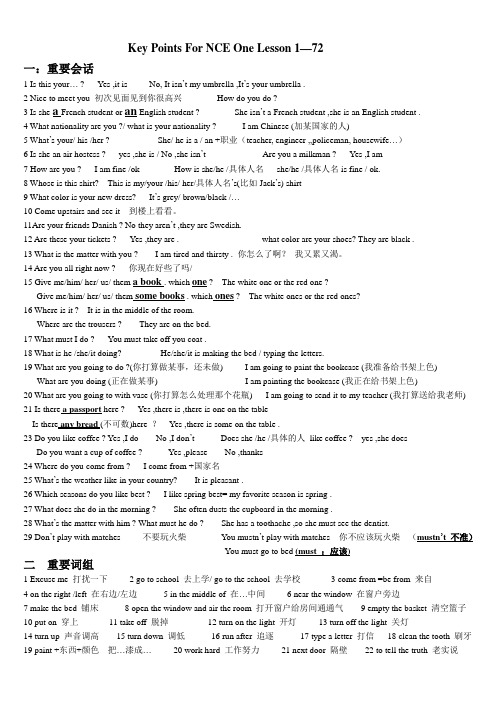
Key Points For NCE One Lesson 1—72一:重要会话1 Is this your… ? Yes ,it is No, It isn’t my umbrella ,It’s your umbrella .2 Nice to meet you 初次见面见到你很高兴How do you do ?3 Is she a French student or an English student ? She isn’t a French student ,she is an English student .4 What nationality are you ?/ what is your nationality ? I am Chinese (加某国家的人)5 What’s your/ his /her ? She/ he is a / an +职业(teacher, engineer ,,policeman, housewife…)6 Is she an air hostess ? yes ,she is / No ,she isn’t Are you a milkman ? Yes ,I am7 How are you ? I am fine /ok How is she/he /具体人名she/he /具体人名is fine / ok.8 Whose is this shirt? This is my/your /his/ her/具体人名’s(比如Jack’s) shirt9 What color is your new dress? It’s grey/ brown/black /…10 Come upstairs and see it 到楼上看看。
11Are your friends Danish ? No they aren’t ,they are Swedish.12 Are these your tickets ? Yes ,they are . what color are your shoes? They are black .13 What is the matter with you ? I am tired and thirsty . 你怎么了啊?我又累又渴。
新概念第一册重点句型
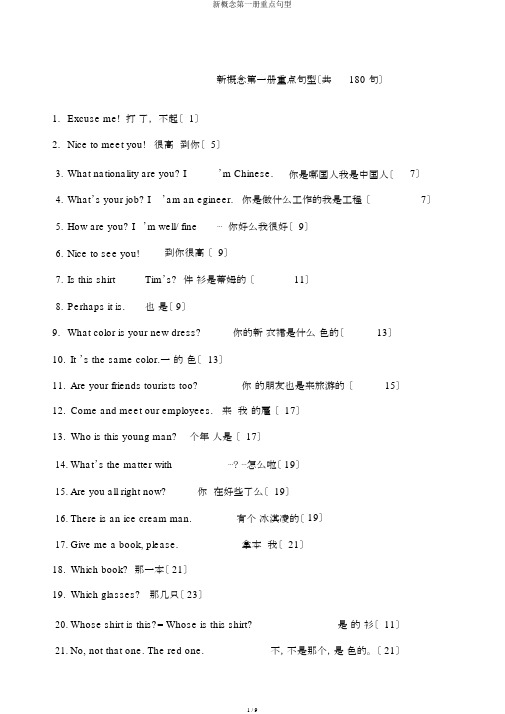
新概念第一册重点句型〔共180 句〕1.Excuse me! 打了,不起〔 1〕2.Nice to meet you! 很高到你〔 5〕3.What nationality are you? I’m Chinese.你是哪国人我是中国人〔7〕4.What’s your job? I ’am an egineer. 你是做什么工作的我是工程〔7〕5.How are you? I’m well/ fine⋯你好么我很好〔 9〕6.Nice to see you!到你很高〔 9〕7.Is this shirt Tim’s? 件衫是蒂姆的〔11〕8.Perhaps it is.也是〔 9〕9.What color is your new dress?你的新衣裙是什么色的〔13〕10.It ’s the same color.一的色〔13〕11.Are your friends tourists too?你的朋友也是来旅游的〔15〕e and meet our employees. 来我的雇〔 17〕13.Who is this young man? 个年人是〔 17〕14.What’s the matter with⋯? ⋯怎么啦〔 19〕15.Are you all right now?你在好些了么〔 19〕16.There is an ice cream man.有个冰淇凌的〔19〕17.Give me a book, please.拿本我〔 21〕18.Which book? 那一本〔 21〕19.Which glasses? 那几只〔 23〕20.Whose shirt is this?= Whose is this shirt?是的衫〔 11〕21.No, not that one. The red one.不,不是那个,是色的。
〔 21〕22.It is on the left/right.它在左侧 /右侧〔 25〕23.There is a table in the middle of the room.房间中央有张桌子〔25〕24.What must I do?我应该做什么〔 30〕25.Put these clothes in the wardrobe.把这些衣服放进衣柜里去〔29〕26.Make the bed. 整理床铺〔 29〕27.Where is she? 她在哪儿〔 31〕28.What is she doing?她在干嘛〔31〕29.She’s sitting in the garden.她正坐在院子里。
(完整)(原创)新概念一册语法句型列表(全)
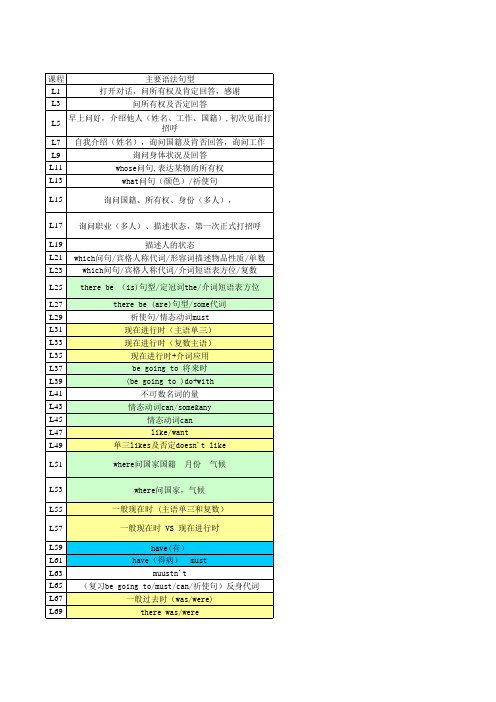
课程主要语法句型L1打开对话,问所有权及肯定回答,感谢L3问所有权及否定回答L5早上问好,介绍他人(姓名、工作、国籍),初次见面打招呼L7自我介绍(姓名),询问国籍及肯否回答,询问工作L9询问身体状况及回答L11whose问句,表达某物的所有权L13what问句(颜色)/祈使句L15询问国籍、所有权、身份(多人),L17询问职业(多人)、描述状态,第一次正式打招呼L19描述人的状态L21which问句/宾格人称代词/形容词描述物品性质/单数L23which问句/宾格人称代词/介词短语表方位/复数L25there be (is)句型/定冠词the/介词短语表方位L27there be (are)句型/some代词L29祈使句/情态动词mustL31现在进行时(主语单三)L33现在进行时(复数主语)L35现在进行时+介词应用L37be going to 将来时L39(be going to )do+withL41不可数名词的量L43情态动词can/some&anyL45情态动词canL47like/wantL49单三likes及否定doesn't likeL51where问国家国籍 月份 气候L53where问国家,气候L55一般现在时 (主语单三和复数)L57一般现在时 VS 现在进行时L59have(有)L61have(得病) mustL63muustn'tL65(复习be going to/must/can/祈使句)反身代词L67一般过去时(was/were)L69there was/wereL71一般过去时(实义动词规则变化)L73一般过去时(实义动词不规则变化)L75一般过去时 VS 一般现在时L77on/at介词短语表时间/复习have、can、mustL79need/have got/mustL81have(吃、喝\吸)L83现在完成时(过去动词had(上一课have的过渡)L85现在完成时(影响)L87现在完成时 VS 一般过去时L89现在完成时(表持续) for sinceL91(一般过去时 现在完成时)一般将来时(will)L93一般过去时 VS 一般将来时L95一般将来时L97belong toL99宾语从句L101间接引语L103宾语从句 too enough veryL105(动词不定式)want sb to.../tell sb toL107形容词比较级和最高级(规则)L109形容词比较级和最高级(不规则)L111形容词原级比较((not)as..as,比较级、最高级L113any、no、either、none、neither、soL115不定代词L117when、whileL119过去完成时L121定语从句L123定语从句L125have to/don't need toL127must be/can't be表肯定的猜测L129must have been/can't have been...对过去肯定的猜测L131may/might表一种可能性L133间接引语L135间接引语(情态动词)L137if条件状语从句(将来)L139宾语从句(if/when/why/what)L141被动语态(一般现在时和一般过去时)L143被动语态(现在完成时和一般将来时)主要内容课程excuse me. Is this your handbag? Yes, it is. Thank you very much.L2 Is this your umbrella? No, it isn't.L4 Good morning! This is Miss Sophie Dupont. Sophie is a new student. She is French. Nice toL6 meet you.Are you French?Yes, I am./No, I am not. What nationality are you? What's your job?L8 How are you? I am fine. How is Emma? She is fine.L10 Whose shirt is that? This is my shirt. It's not my shirt.L12 What color's your new dress? It's green.L14Are you Swedish? No, we are not. Are these your cases? No, they aren't. Are you tourists? Yes,L16 we are.What are their jobs? They're keyboard operators. Those women are very hard-working. How doL18 you do?We're tired and thirsty. No, we aren't. Yes, we are. Are you all right now?L20 Give me a book please, Jane. Which book? The red one.L22 Give me some glasses please, Jane. Which glasses? The ones on the shelf.L24 There is a cooker in the kitchen. The cooker is blue.L26 There are some magazines on the television.L28 Come in,Amy. What must I do,Mrs.Jones?L30 She is sitting under the tree.L32 They are walking over the bridge.L34 Some children are coming out of the building.L36 I'm going to paint it. I'm going to paint it pink.L38 What are you going to do with it? I'm going to put it here, in front of the window.L40 A piece of cheese. A loaf of bread. A bar of soap. A bottle of milk.L42 Is there any waer in this kettle? There are some cups in the cupboard.L44 Can you type this letter for the boss please, Pamela? I can't type this letter.L46 Do you want any milk? I don't like milk in my coffee.L48 My husband likes steak, but he doesn't like chicken.L50Where do you come from? I come from Greece. What's the weather like in spring? It's oftenL52 windy in March....It's often wet in the West. I like spring and summer. The days are long and the nights are short.L54 The sun rises early.In the morning, Mr. Sawyer goes to work and the children go to school.L56It's ten o'clock. Mrs Sawyer usually stays at home in the morning,but this morning, she is goingL58 to the shops.Do you have any writing paper? I don't have any small pads. I only have large ones.L60He had a bad cold, so he must stay in bed.L62You mustn't get up yet. Must he stay in bed?L64Enjoy yourself! We always enjoy ourselves.L66I was at the greengrocers. Were you at the butcher's?L68in 1995,there was a very big race. There were twenty cars in the race.L70He telephoned my four times yesterday. My boss answered the telephone.But I didn't answerL72 the phone.Last week Mrs. Mills went to London. Then he put his hand into his pocket and took out aL74 phrasebook.We had some shoes like those a month ago, but we don't ahve any now.L76Can you come at 10 a.m. on Monday ,April 24th? Do you have an appointment. I have aL78 toothache. I must see...I must go to the grocer's. We haven't got much tea or coffee. We need some meat.L80 We can have dinner at seven o'clock. We had roast beef and potatoes.L82 I've just had a cup.I've already had lunch.L84 Have you just been to the cinema? I've already seen it.L86 I brought it here three days ago. Have your mechanics finished yet?L88 I've lived here for twenty years. I've been here since 1976.L90 Will you see Ian today, Jenny? Has Ian sod his house yet? He sold it last week.L92 He was in the R.A F. He will fly to New York next month.L94 What time will the next train leave?L96 This case doesn't belong to me.L98 The doctor says that he will come at once. I'm sure that you need an X-ray.L100 He says he's just arrived in Scotland.L102The questions were very easy. They were too difficult for me. The English and Maths papersL104 weren't easy enough for me.I want her to come to my office. Tell her to come at once. I want her.L106 It's smaller than the blue one.This is the largest dress in the shop.L108 Just a little,please. Less than that. Eat more and smoke less.L110It's not as good as the expensive one. The other model's more expensive.It's the most expensiveL112 model in the shop.I've got no small change.I've got none. I haven't got any either. Neither can I. So have I.L114Isn't there anyone at home? Everything's very quiet. Nothing at all.Everyone's in the garden.L116 Everybody wants to..When my husband was going into the dining room this morning, he dropped some coins on theL118 floor. While we were...Tommy found ....After they had entered the house, they went into the dining room.L120 The lady who is standing behind the counter.L122 They are people I met during the trip.L124 Do you have to water it now? You don't need to water the garden.L126 It must be Karen Marsh, the actress. It can't be.L128 You must have been driving at seventy miles an hour. I can't have been.L130 We may go abroad. We might not go anywhere.L132 She told me she had just made a new film.She told reporters she felt very tired.L134 She said she couldn't make up her mind.L136 If I win a lot of money I'll buy you a mink coat.L138I said I would be at your house at six o'clock. My wife wants to know if Mary needs any help.IL140 don't know what you're talking about.Last week, my four-year-old daughter,Sally,was invited to a children's party.L142Vistors have been asked to keep the woods clean and tidy.L144操练内容物品人、物品车牌职业形容词物主代词颜色国籍,颜色职业(复数)(主语多人)形容词宾格代词,形容词宾格单词、物品there be句型,形容词描述物品性质或状态there be句型,介词短语表方位祈使句、must特殊疑问句单三(he/she/it)现在进行时复数(they,we,you)现在进行时现在进行时+介词(表方位)be going to与be doing对比do with sth.Is there+a/any(不可数名词)Are there any/Is there any...?can/can'tlike/want/序数词likes/doesn't likeWhat nationality? e from? What nationality? e from?一般现在时时间(整点)、一般现在时 VS 现在进行时时间(整点)、Do you have any?have(得病) mustmustn't时间(half\quarter)/日期/反身代词时间(非整点)、was/were was/were+on/in/at表示的过去时间过去时间/一般过去时(规则动词)一般过去时(不规则动词)过去时间短语/一般过去时at/on/in表时间I must go to... /Need/have gothave\had(吃、喝\)(做、从事)Have you had...?have done(规则动词的过去分词)have done(不规则动词的过去分词)have done(不规则动词的过去分词)将来时间/will dodid VS willago VS in..time(时间)/did VS willbelong to VS 名词性物主代词宾语从句宾语从句too enough very(动词不定式)(don't)want sb to.../tell sb to 形容词、比较级、最高级(规则)形容词、比较级、最高级(不规则)形容词((not)as..as,比较级、最高级(more/the most)any、no、either、none、neither、so every/no/any/some+body/one/thing/wherewhen/while/just as过去完成时定语从句(who(whom),which,that) who(whom)、which、that主语+系动词全省略,宾语时省略代词have to/don't need tomust be/can't be表肯定的猜测must have been/can't have been...may be/may have been/He said/told me(that) heHe said/told me(that) he+情态动词if(将来/can)He wants to know if/why/what/when被动语态(一般现在时和一般过去时)被动语态(现在完成时和一般将来时)。
新概念第一册重点句型 - 修改名词: 新概念第一册重要句子

新概念第一册重点句型 - 修改名词: 新概念第一册重要句子新概念第一册重要句子以下是新概念第一册中一些重要的句型和句子,供参考使用:1. She is a student.(她是一个学生。
)2. He is a teacher.(他是一个教师。
)3. This is a book.(这是一本书。
)4. That is a pen.(那是一支笔。
)5. I have a car.(我有一辆车。
)6. They have two cats.(他们有两只猫。
)7. We can speak English.(我们会说英语。
)8. He can play the piano.(他会弹钢琴。
)9. She likes to read.(她喜欢阅读。
)10. He likes playing football.(他喜欢踢足球。
)11. I want to go shopping.(我想去购物。
)12. She wants to eat ice cream.(她想吃冰淇淋。
)13. They are my friends.(他们是我的朋友。
)14. We are going to the cinema.(我们要去电影院。
)15. He is tall and handsome.(他又高又帅。
)16. She is wearing a beautiful dress.(她穿着一条漂亮的裙子。
)17. The weather is sunny.(天气晴朗。
)18. I am happy today.(我今天很开心。
)19. They are studying in the library.(他们正在图书馆研究。
)20. We will have a party tomorrow.(我们明天要开个派对。
)这些句子是学习新概念第一册时的重点句型,希望能对你学习英语有所帮助。
- 1、下载文档前请自行甄别文档内容的完整性,平台不提供额外的编辑、内容补充、找答案等附加服务。
- 2、"仅部分预览"的文档,不可在线预览部分如存在完整性等问题,可反馈申请退款(可完整预览的文档不适用该条件!)。
- 3、如文档侵犯您的权益,请联系客服反馈,我们会尽快为您处理(人工客服工作时间:9:00-18:30)。
新概念第一册重点句型 Company number【1089WT-1898YT-1W8CB-9UUT-92108】新概念第一册重点句型(共180句)1.Excuse me! 打扰了,对不起(1)2.Nice to meet you!很高兴见到你(5)3.What nationality are you? I’m Chinese.你是哪国人我是中国人(7)4.What’s your job? I’am an egineer.你是做什么工作的我是工程师(7)5.How are you? I’m well/ fine…你好么我很好(9)6.Nice to see you! 见到你很高兴(9)7.Is this shirt Tim’s?这件衬衫是蒂姆的吗(11)8.Perhaps it is.也许是(9)9.What color is your new dress? 你的新连衣裙是什么颜色的(13)10.It’s the same color.一样的颜色(13)11.Are your friends tourists too? 你们的朋友也是来旅游的吗(15)e and meet our employees.来见见我们的雇员(17)13.Who is this young man?这个年轻人是谁(17)14.What’s the matter with…?…怎么啦(19)15.Are you all right now? 你们现在好些了么(19)16.There is an ice cream man. 有个卖冰淇凌的(19)17.Give me a book, please. 请拿本书给我(21)18.Which book? 那一本(21)19.Which glasses? 那几只(23)20.Whose shirt is this?= Whose is this shirt?这是谁的衬衫(11)21.No, not that one. The red one. 不,不是那个,是红色的。
(21)22.It is on the left/right. 它在左侧/右侧(25)23.There is a table in the middle of the room. 房间中央有张桌子(25)24.What must I do? 我应该做什么(30)25.Put these clothes in the wardrobe. 把这些衣服放进衣柜里去(29)26.Make the bed. 整理床铺(29)27.Where is she? 她在哪儿(31)28.What is she doing? 她在干嘛(31)29.She’s sitting in the garden.她正坐在院子里。
(31)30.What about the dog? 那么狗呢(31)31.It’s running after a dog.它正在追一只猫。
(31)32.This is a photograph of our village. 这是一张我们村庄的照片。
(35)33.It’ s between two hills.它在两座小山之间。
(33)34.Some children are coming out of the building. 一些孩子正从楼里出来。
(35)35.Some of them are going into the park. 他们中有几个正走进公园。
(35)36.What are you going to do? 你打算去干什么(37)37.What color are you going to paint it? 你打算把它漆成什么颜色(37)38.It’s for my daughter.它是给我女儿的。
(37)39.Pink’s my favorite color.粉红色是我最喜欢的颜色。
(37)40.What are you going to do with it? 你打算怎么处理它(39)41.Don’t drop it!别摔了!(39)42.Can you make the tea? 你会沏茶么(43)43.Hurry up! 快点!(43)44.Can you come here a minute please? 请你来一下好吗(45)45.Do you want a cup? 你想要一杯吗(47)46.Do you want any sugar? 你要些糖吗(47)47.Do you like biscuits? 你喜欢饼干吗(47)48.My husband doesn’t like chicken. 我丈夫也不喜欢鸡肉。
(49)49.To tell you the truth, I don’t like chicken either.说老实话,我也不喜欢鸡。
(49)50.Where do you come from?= Where are you from? 你从哪儿来(51)51.What’s the climate like in your country?你们国家的气候怎么样(51)52.What’s the weather like in spring?春天的天气怎么样(51)53.Which season do you like best? 你最喜欢哪个季节(53)54.The sun rises early and sets late. 太阳升得早而落得晚。
(53)55.It’s our favourite subject of conversa tion.它是我们最喜欢谈论的话题。
(53)56.Their father takes them to school every day. 他们的父亲每天都送他们去上学。
(55)57.He arrives home late. 他到家很晚。
(55)58.What’s the time?=What time is it?几点了(58)59.Is all that? 就这些吗(59)60.Do you want the large size or the small size? 你想要大号的还是小号的(59)61.What else do you want? 你还要什么吗(59)62.What’s the matter with him?他怎么啦(61)63.He feels/looks ill. 他感觉/看起来病了。
(61)64.We must call the doctor. 你必须请医生。
(61)65.He must stay in bed for a week. 他必须卧床一周。
(61)66.You mustn’t get up yet. 你还不应该起床。
(63)67.He must remain in bed for another two days. 他必须再卧床两天。
(63)68.You must keep the room warm. 你必须保持房间温暖。
(63)69.Was he absent from school last week? 他上星期上学了么(67)70.We are going to spend three days in the country. 我们打算到乡下去三天。
(67)71.There were hundreds of people there. 许许多多的人到在哪儿。
(69)72.You can see us in the crowd. 你可以在人群中看到我们。
(69)73.What’s he like?他怎么样(71)74.She can’t speak to you now!他现在不能和你说话。
(71)75.She does not know London very well. 她对伦敦不熟悉。
(73)76.She lost her way. 她迷路了。
(73)77.Can you tell me the way to …你能告诉我到…怎么走么(73)78.Then he put his hand into his pocket and took out a phrasebook. 然后他把手伸进衣袋里掏出了一本手册。
(73)79.Can you get a pair for me? 您能为我找一双吗(75)80.I’m afraid that I can’t. 我恐怕不行。
(73)81.They were in fashion last year. 它们去年时兴。
(75)82.Do you have an appointment? 您约好了吗(77)83.Is it urgent? 很急吗(77)84.Can’t you wait till this afternoon ? 你就不能等到今天下午吗(77)85.I’m making a shopping list. 我正在写购物单。
(79)86.We need a lot of things this week. 这星期我们需要很多东西。
(79)87.We haven’t got much tea or coffee. 我们的茶叶和咖啡不多了。
(79)88.We haven’t got any meat at all. 我们一点肉都没有了。
(79)89.He is having a bath. 他正在洗澡。
(81)90.I’m nearly re ady. 我马上就好。
(81)91.I’ve already had lunch. 我已经吃过午饭了。
(83)92.Excuse the mess! 屋里很乱,请原谅!(83)93.I stayed at home. 我呆在家里。
(83)94.Have you just been to the cinema? 你刚去过电影院吗(85)95.What’s on? 上映什么电影? (85)96.Have you ever been there? 你曾经去过那儿吗(85)97.It rained all the time. 一直在下雨。
(85)98.Just like London! 就像伦敦。
(85)99.When did you bring it to us? 您是什么时候送来的(87)100.Have your mechanics finished yet? 你们的机械师修好了吗(87)101.Let’s go into the garage and have a look at it. 让我们到车库去看一看吧。
(87)102.They’re trying to repair it! 他们正设法修呢!(87)103.I believe that this house is for sale. 我想这房子是要出售吧!(89)104.How long have you lived here? 你住这多久了(89)105.How much does this house cost? 这座房子卖多少钱(89)106.It’s worh every penny of it. 它确确实实值这么多钱!(89)107.Has he moved to his new house yet? 他已经迁进新居了吗(91)108.We’ll all miss him! 我们所有人都会想他的。
